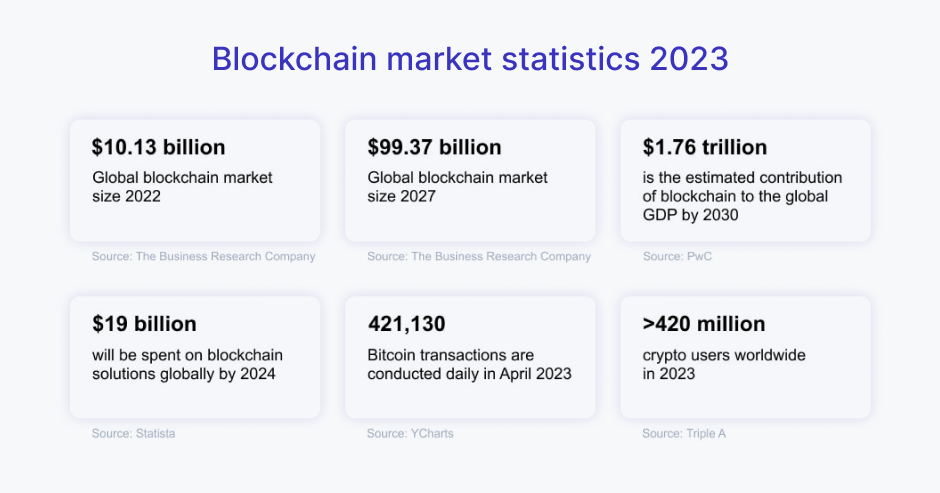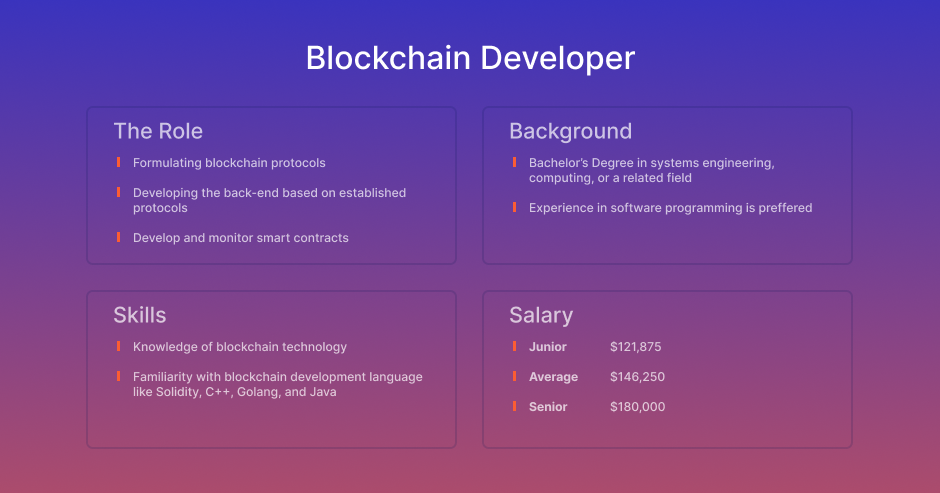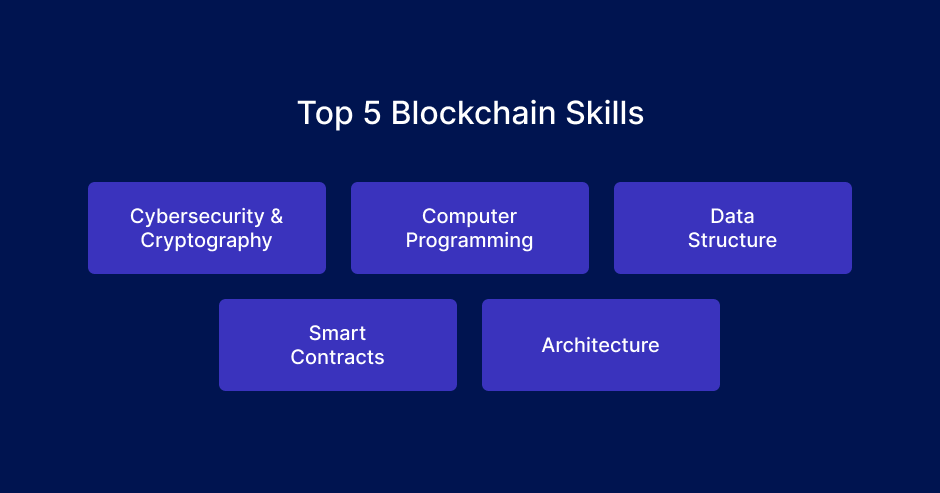Blockchain technology is transforming data security and transparency, fueling a surge in demand for skilled Blockchain developers. Zippia reports that over 300 million people (3.9% of the global population) use blockchain for cryptocurrency, with 82 million users of blockchain wallets worldwide.

Beyond cryptocurrency, Blockchain has penetrated various industries, posing a challenge for developers and tech companies aiming to hire top talent. To assist, we've curated this guide outlining the crucial skills blockchain developers require. Keep reading to learn more!
Also read: How Index.dev helped Venly hire diverse tech talent for its blockchain development team

1. Blockchain Architecture
Understanding the fundamentals of blockchain technology is essential for any developer looking to excel in this field. The architecture forms the foundation upon which all blockchain applications are built, making it crucial for developers to comprehend its core components and how they interact with one another.
Blockchain developers should be familiar with different types of blockchains, such as public, private, and consortium blockchains. Each type comes with its unique set of properties, benefits, and use cases, making it vital for developers to understand when to employ each one.
Moreover, knowledge of blockchain components, including blocks, transactions, and consensus mechanisms, is necessary for developers to create robust and secure applications. By grasping these components, developers can better navigate the complexities of blockchain development and create innovative solutions that leverage the full potential of this cutting-edge technology.
Skip the talent struggle. Connect with seasoned, expertly vetted blockchain developers effortlessly. Get started in just 48 hours →
2. Cryptography
At the heart of blockchain technology lies cryptography, a crucial component for securing the integrity and confidentiality of data within a blockchain network. Understanding the basics of cryptography and encryption is essential for any developer working in this field.
Blockchain developers should be familiar with various cryptographic algorithms and hash functions. These cryptographic tools provide the basis for the secure, tamper-proof nature of blockchain technology, ensuring that data remains protected from malicious attacks and unauthorized access.
Moreover, the role of cryptography extends beyond securing individual transactions. It also plays a vital part in the consensus mechanisms used by blockchain networks to maintain their distributed and decentralized nature. By mastering the intricacies of cryptographic techniques, developers can contribute to the development of more secure and robust blockchain applications that can withstand the ever-evolving landscape of cybersecurity threats.
3. Smart Contracts
Smart contracts are self-executing agreements with the terms of the contract directly written into lines of code. These digital contracts are a key component of many blockchain applications, and developers must possess a strong understanding of how to develop and deploy them.
Blockchain developers should be proficient in programming languages used for smart contract development, such as Solidity, which is a popular language for creating smart contracts on the Ethereum blockchain. Mastering these languages allows developers to create secure and efficient smart contracts that can automate processes, reduce the need for intermediaries, and enhance the overall functionality of blockchain applications.
Additionally, understanding the role of smart contracts in blockchain applications is crucial for developers. By grasping the underlying concepts and potential use cases for smart contracts, developers can better design and implement solutions that leverage the full potential of this innovative technology, creating more secure, efficient, and transparent applications.
Also read: The FinTech revolution: Transforming finance with technology
4. Decentralized Application (DApp) Development
In the world of blockchain technology, decentralized applications (DApps) are a key innovation that sets them apart from traditional, centralized applications. As a blockchain developer, it's crucial to be familiar with the process of developing DApps and understand the differences between these and traditional applications.
DApps are built on blockchain frameworks like Ethereum and Hyperledger, which offer a decentralized infrastructure for creating applications that run on a peer-to-peer network. This decentralized nature ensures that no single entity has control over the application, resulting in enhanced security, transparency, and trust.
Experience in working with these blockchain frameworks is vital for developers looking to create innovative and successful DApps. By understanding the unique characteristics and challenges associated with DApp development, blockchain developers can create solutions that fully leverage the power of blockchain technology and revolutionize industries across various sectors.
5. Programming Languages
Proficiency in popular programming languages used in blockchain development, such as C++, Python, Java, and JavaScript, is essential for developers looking to make a mark in the blockchain space. These languages form the foundation for creating secure and efficient blockchain applications that cater to various industries and use cases.
Beyond mastering the popular programming languages, it's important for blockchain developers to stay up-to-date with new and emerging languages in the field. As the blockchain landscape continues to evolve, novel programming languages may surface, offering unique features and benefits that can help developers create more innovative and effective solutions. By keeping a finger on the pulse of the latest developments in programming languages, blockchain developers can maintain a competitive edge and build cutting-edge applications that fully leverage the potential of blockchain technology.
Also read: 10 programming languages that will land you a salary of $100k in the US
6. Data Structures
Understanding the importance of data structures in blockchain development is crucial for any developer working in this field. Data structures form the backbone of blockchain systems, enabling the storage, organization, and management of data in a secure and efficient manner.
Blockchain developers should be familiar with common data structures used in blockchain systems, such as Merkle trees, hash tables, and linked lists. Merkle trees, for instance, are used to store and verify transaction data in a tamper-proof way, ensuring the security and integrity of the blockchain. Hash tables provide a fast and efficient method for looking up data, while linked lists serve as the fundamental structure for organizing blocks within the blockchain.
By mastering these data structures and their applications within blockchain systems, developers can create more robust and efficient solutions that leverage the full potential of this cutting-edge technology.
Also read: Data Analyst job description: Skills for remote software teams
7. Consensus Algorithms
Consensus algorithms play a crucial role in ensuring the security and integrity of blockchain networks. These algorithms enable network participants to agree on the state of the blockchain, preventing tampering and double-spending issues. Blockchain developers should possess knowledge of various consensus algorithms, such as Proof of Work, Proof of Stake, and Delegated Proof of Stake, to build secure and efficient blockchain systems.
Each consensus algorithm comes with its own set of advantages and drawbacks, making it essential for developers to understand when to employ each one. For example, Proof of Work is the most widely used consensus algorithm in popular blockchains like Bitcoin and Ethereum but comes with high energy consumption and scalability limitations. On the other hand, Proof of Stake offers a more energy-efficient and scalable solution but may not provide the same level of security as Proof of Work.
By understanding how consensus algorithms ensure the security and integrity of blockchain networks, developers can choose the best fit for their projects and create robust solutions that effectively leverage the potential of blockchain technology.
Seeking long-term, high-paying remote blockchain jobs? Your search ends here with Index.dev. Sign up now and get connected with premier US enterprises, startups, and projects →
8. Debugging and Troubleshooting
Developing blockchain applications comes with its fair share of challenges, and the ability to identify and resolve issues is a crucial skill for any developer. Debugging and troubleshooting involve analyzing the application's behavior, identifying potential problems, and implementing appropriate solutions to ensure the smooth functioning of the system.
Experience in using debugging tools and techniques is vital for addressing problems efficiently and effectively. Developers should be familiar with a range of debugging practices, such as code analysis, breakpoints, and log analysis, to pinpoint the root cause of issues and devise suitable solutions. By mastering the art of debugging and troubleshooting, blockchain developers can create more robust and reliable applications that offer a seamless user experience.
9. Distributed Systems
Blockchain technology is deeply rooted in the principles of distributed systems, making it essential for developers to understand their relevance and application in this field. Distributed systems are collections of interconnected nodes that communicate and collaborate to achieve a common goal, such as maintaining a shared ledger in the case of blockchain networks. By understanding these principles, developers can better design and implement blockchain applications that leverage the full potential of a decentralized infrastructure.
Building and maintaining distributed systems come with their own set of challenges and complexities. These systems often require developers to address issues such as data consistency, fault tolerance, and scalability. Familiarity with these challenges and the techniques used to overcome them is crucial for blockchain developers, as it allows them to create more resilient and efficient applications that can withstand the demands of a global, decentralized network.
10. Problem-Solving and Analytical Skills
Strong problem-solving abilities are essential for blockchain developers, as they often face complex challenges while working on innovative solutions in the ever-evolving landscape of blockchain technology. Being able to tackle these challenges effectively requires a combination of critical thinking, creativity, and analytical skills.
Developers must be adept at breaking down complex problems into smaller, manageable components and devising strategies to address each part. This process involves analyzing the situation, evaluating potential solutions, and selecting the most effective course of action. By honing their problem-solving and analytical skills, blockchain developers can create innovative and robust applications that stand out in the competitive blockchain landscape.
Also read: High-performing developers vs average developers: What sets the top 1% apart

Discover Index.dev Today
If you’re a tech company looking for high-performing blockchain developers, let Index.dev be your trusted partner in building a strong and talented development team that will drive the success of your tech company.
If you're a skilled blockchain developer seeking high-paying remote jobs, joining Index.dev can connect you with promising projects in the US, UK, and EU markets.